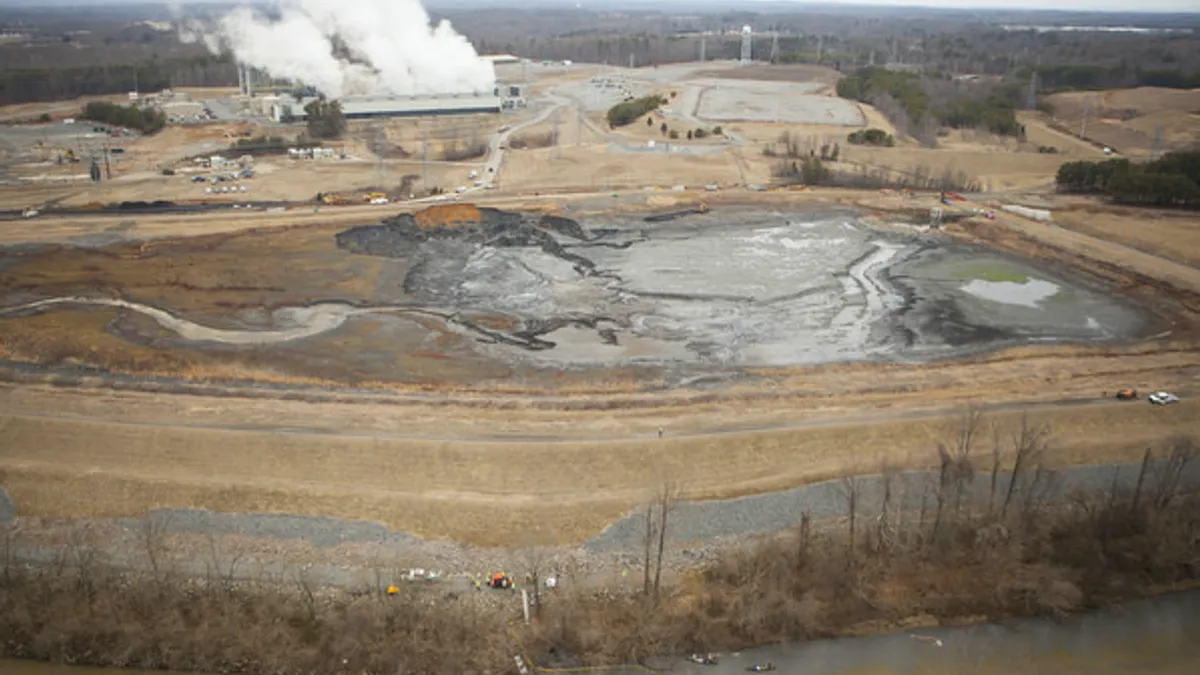Dive Brief:
- The North Carolina Coal Ash Management Commission, which was created months after Duke Energy's coal ash spill into the Dan River in 2014 with the aim of helping review closure and cleanup of Duke Energy's coal ash ponds by the state's Department of Environmental Quality, was suddenly disbanded last week, according to the Raleigh News & Observer.
- The Coal Ash Management Commission's Executive Director Natalie Birdwell told legislators in an email on Monday last week that “she had just been informed by the Governor’s Office that the Commission was no longer a legal entity." The Governor's Office did not comment to the Raleigh News & Observer.
-
Gov Pat McCrory (R) challenged legislative appointments to the commission based on constitutional grounds a little more than a year ago, ultimately winning the case in front of the state Supreme Court in January. At the time, the governor's lawyers said that members of the commission would need to be appointed anew.
Dive Insight:
Coal ash cleanup has been a major issue in North Carolina since Duke Energy's coal ash waste spilled into the Dan River in 2014. The disbanding of the commission is a blow to the lawmakers and advocates who argued that an independent governing body was necessary to oversee the cleanup of coal ash waste in the state.
Gov. McCrory challenged the constitutional legality of the commission, arguing that because it was created by legislative action, it placed unconstitutional limits on his executive powers. The North Carolina Supreme Court ruled in McCrory's favor.
"We hold that, while the appointments clause itself places no restrictions on the General Assembly’s ability to appoint statutory officers, the challenged provisions violate the separation of powers clause,” the justices said in the ruling. “In short, the legislative branch has exerted too much control over commissions that have final executive authority. By doing so, it has prevented the Governor from performing his express constitutional duty to take care that the laws are faithfully executed.”
The nine-member commission was created to ensure that the lengthy process of closing coal ash ponds was done properly and to review DEQ's proposed risk classifications for the ponds. According to The Raleigh News & Observer, the North Carolina DEQ said in a statement that there will be no change in its implementation of the Coal Ash Management Act.
The Coal Ash Management Commission, which had to suspend its operations when the suit was filed, had planned statewide hearings about its priority list for closing and cleaning up coal ash ponds. The DEQ will hold public meetings this month on proposed risk classifications in order to determine the process to close the ponds without final review from the shuttered commission.
In June 2015, the North Carolina Supreme Court ruled that the state’s 2014 coal ash law allows Duke Energy until 2029 to complete its coal ash cleanup in the state. The utility revealed in regulatory filings that it had identified an estimated 200 leaks and seeps at 32 coal ash storage sites, with the leaks releasing over 3 million gallons of contaminated wastewater daily.
Duke Energy said it “will comply with the law and rules that govern coal ash basin closure. We are focused on closing basins in ways that put safety first, protect the environment, minimize impacts to communities and manage costs,” the News & Observer reports.













